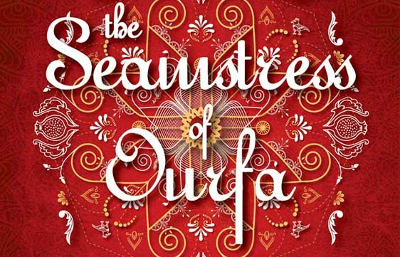
I have just spent a week planting trees in my garden by the sea in Euboea. In the evenings (it gets dark at around five), when there was no television and I was alone, I read The Seamstress of Ourfa. It took me time to read it because I had to keep stopping to absorb what I had just read. Of course it made me happy as a book, because it took me back to my own childhood in a Greek village, the smells above all, of woodsmoke in November, the warm, loamy forest earth, fresh laundry, a smoothing-iron full of coals kept hot on the fire. The kneading of bread in a wooden trough. The smell of leaven. Rough hands dusted with flour. Being pinched on the cheek and spat at to keep away the evil eye. The expression “Ayde” – or “Hayde” – meaning “Come on!”. Is that an Armenian expression? And many other words and customs, since the Armenian Christians in Ourfa had so much in common with where I grew up. And in our village, many refugees also came from Asia Minor after 1918.
My grandfather worked with Nansen then, to give the refugees new homes, and new lives and passports. The Nansen passport, it was called. He hated Ataturk, whom he considered a cold and heartless villain. But reading the Seamstress of Ourfa puts my memories now into a different historical context and takes me even further back, to the end of the nineteenth century and the fall of the Ottoman Empire. Things were crumbling then, and societies which had functioned on variety and difference where being swept away. Armenians and Jews, Greeks, Christians and Muslims beside one another, trading together, working together, even changing their religions and marrying each other. And then some ghastly spirit was unleashed – the spirit of nationalism and hatred?
So I was happy last week to be planting my trees, far away from the land of Brexit, and with this book for company, and thinking warmly of the many things in this world that are true and lasting and good – as I turned over the soft tilth and planted trees for my great grandchildren!
Because now, again, we are face to face with the loss of homes, farms, shops, cafes, businesses, family, the cruel displacement of people on a massive scale, driven away by massacre and burning. The loss of continuity and history and memory. And we, the “decadent west”, as I like to call us, are aiding this, supporting it every step of the way, by supplying weapons which kill people, so that we can fuel our own economies, and pay for our most trivial comforts. And this, not because we cannot change it, but through a feeble, failure of the imagination, and an inability to apply the most ordinary and eternal law – thou shalt not kill – in an international court.
Is this all due to some feverish form of idealism and detachment from the earth, from ordinary kindness and love and the wish to nurture and bring forth good things?
I want everyone to read The Seamstress of Ourfa, to understand a little more about the terrible cycle of discrimination and attrition. It brings to mind thoughts of Syria, of Aleppo, of the people arriving in England and Germany and Sweden now, with no links and no contacts with their former life. And the contrast they must find when they arrive, the coldness of the north – where somehow things must seem very square, for want of a better word. Very constructed. Very far from the land where orange trees hang heavy with golden fruit.
Now I am thinking again of Goethe, and Thomas Mann, or his fictional hero Aschenbach, with his own, idealistic, pursuit of “form”, and his subsequent rush towards the south.
People may complain, for example, that Greek novels are difficult for “northerners” because they are too fabulous, too rooted in the soil, perhaps too lodged in memory, which may be the memory of painful experiences. I say, memory is eternal. Within memory is also humour and affection and kindliness, tales of home, where food is cooked and work is done and children, eccentricity and familiarity flourish. Better than history books, it is novels that can set before us, honestly, the terrible things that have come to pass. But they also give us back hope, identity and memory.
To go back to Greek Tragedy, such books remember the instincts, godlike or not, that will lead to a fall. But they also celebrate the triumph of something more godlike in another way, something that will allow us to begin again, and to go on remembering. Memory is eternal, because a loss is only complete when we cease to remember the things that we loved.
And so I bow in homage to the author of The Seamstress of Ourfa, who has set these things down in such a warm and affectionate way, and has unraveled a thread for us to follow, and to make our way back through history to a fuller understanding of the things that came to pass. May she help to persuade us, without rancour or bigotry, not to repeat them!
-Irene Noel-Baker

